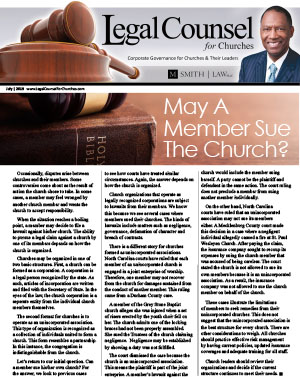Occasionally, disputes arise between churches and their members. Some controversies come about as the result of action the church chose to take. In some cases, a member may feel wronged by another church member and wants the church to accept responsibility.
When the situation reaches a boiling point, a member may decide to file a lawsuit against his/her church. The ability to pursue a legal claim against a church by one of its members depends on how the church is organized.
Churches may be organized in one of two basic structures. First, a church can be formed as a corporation. A corporation is a legal person recognized by the state. As such, articles of incorporation are written and filed with the Secretary of State. In the eyes of the law, the church corporation is a separate entity from the individual church members themselves.
The second format for churches is to operate as an unincorporated association. This type of organization is recognized as a collection of individuals united to form a church. This form resembles a partnership. In this instance, the congregation is indistinguishable from the church.
Let’s return to our initial question. Can a member sue his/her own church? For the answer, we look to previous cases to see how courts have treated similar circumstances. Again, the answer depends on how the church is organized.
Church organizations that operate as legally recognized corporations are subject to lawsuits from their members. We know this because we see several cases where members sued their churches. The kinds of lawsuits include matters such as negligence, governance, defamation of character and breach of contracts.
There is a different story for churches formed as unincorporated associations. North Carolina courts have ruled that each member of an unincorporated church is engaged in a joint enterprise of worship. Therefore, one member may not recover from the church for damages sustained from the conduct of another member. This ruling came from a Durham County case.
A member of the Grey Stone Baptist church alleges she was injured when a set of risers erected by the youth choir fell on her. The church admits one of the locking braces had not been properly assembled. She sued the Trustees of the church claiming negligence. Negligence may be established by showing a duty was not fulfilled.
The court dismissed the case because the church is an unincorporated association. This means the plaintiff is part of the joint enterprise. A member’s lawsuit against the church would include the member suing herself. A party cannot be the plaintiff and defendant in the same action. The court ruling does not preclude a member from suing another member individually.
On the other hand, North Carolina courts have ruled that an unincorporated association may not sue its members either. A Mecklenburg County court made this decision in a case where a negligent individual allegedly caused a fire at St. Paul Wesleyan Church. After paying the claim, the insurance company sought to recoup its expenses by suing the church member that was accused of being careless. The court stated the church is not allowed to sue its own members because it is an unincorporated association. As a result, the insurance company was not allowed to sue the church member on behalf of the church.
These cases illustrate the limitations of members to seek remedies from their unincorporated churches. This does not suggest that the unincorporated association is the best structure for every church. There are other considerations to weigh. All churches should practice effective risk management by having current policies, updated insurance coverages and adequate training for all staff.
Church leaders should review their organizations and decide if the current structure continues to meet their needs.

